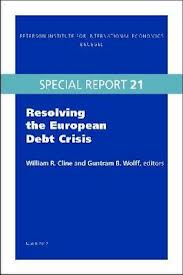Dadush, Uri, (2012), ‘The Euro-Exit Taboo’, nationalinterest.org, 1 May. Stay or leave? Should Greece persist with its extreme austerity plan, or should it abandon the euro? What about Portugal? Spain? In mainstream political discourse, posing the question of euro exit is taboo. When Prime Minister Papandreou of Greece, an ardent European, unexpectedly proposed a national referendum on the matter (one he expected adherents to the euro to win) he was …Read More
Sovereign spreads in the eurozone: which prospects for a Eurobond?
Favero, Carlo, Missale, Alessandro, (2012),‘Sovereign spreads in the eurozone: which prospects for a Eurobond?’, Economic Policy, Vol. 27, Issue 70, p.p. 231 – 273. In this paper, we provide new evidence on the determinants of sovereign yield spreads and ‘market sentiment’ effects in the eurozone in order to evaluate the rationale for a common Eurobond jointly guaranteed by eurozone Member States. We find that default risk is the main driver …Read More
Greece needs plans for growth, not eurozone exit
Katsikas, Dimitris, (2012), “Greece needs plans for growth, not eurozone exit”, www.publicserviceeurope.com, 23 March. The second bail-out agreement for Greece has been hailed by the political elites in Europe and the parties of the Greek governing coalition as a historic achievement that paves the way for the country’s return to normalcy. Nonetheless, as soon as it was signed, a number of analysts criticised it as insufficient and predicted that in …Read More
Resolving the European Debt Crisis
Cline, William, Wolf, Guntram (eds),(2012), Resolving the European Debt Crisis, Special Report 21, Peterson Institute for International Economics and Bruegel. What began as a relatively localized crisis in Greece in early 2010 soon escalated to envelop Ireland and Portugal. By the second half of 2011, the contagion had spread to the far larger economies of Italy and Spain. In mid-September the Peterson Institute and Bruegel hosted a conference designed to …Read More
Saving Europe: How National Politics Nearly Destroyed the Euro
Bastasin, Carlo, (2012), Saving Europe: How National Politics Nearly Destroyed the Euro, Washington: Brookings Institution Press. Three times in the few years since the global financial crisis erupted, the euro has come close to extinction, endangering both the world economy and history’s most ambitious project in shared sovereignty. Yet each time, the case for a common currency proved to be more compelling than its weaknesses, and the euro survived. Saving Europe reveals …Read More
A simple and flexible alternative to Stability and Growth Pact deficit ceilings. Is it at hand?
Muscatelli, Vito & Piergiovanna, Natale, (2012), ‘A simple and flexible alternative to Stability and Growth Pact deficit ceilings. Is it at hand?’, European Journal of Political Economy,Volume 28, Issue 1, p.p. 14–26. We model a monetary union where fiscal discretion generates excessive debt accumulation in steady state and inefficiently delayed debt adjustment following shocks. By setting a debt target and raising the political cost of deviating from the optimal pace …Read More
Sovereign Debt Restructurings 1950-2010; Literature Survey, Data, and Stylized Facts,
IMF, (2012), Sovereign Debt Restructurings 1950-2010; Literature Survey, Data, and Stylized Facts, IMF Working Papers, Monetary and Capital Markets Department, Washington. This paper provides a comprehensive survey of pertinent issues on sovereign debt restructurings, based on a newly constructed database. This is the first complete dataset of sovereign restructuring cases, covering the six decades from 1950–2010; it includes 186 debt exchanges with foreign banks and bondholders, and 447 bilateral debt …Read More
European Member State Elites’ Diverging Visions of the European Union: Diverging Differently since the Economic Crisis and the Libyan Intervention’
Schmidt, Vivien, (2012), ‘European Member State Elites’ Diverging Visions of the European Union: Diverging Differently since the Economic Crisis and the Libyan Intervention’, Journal of European Integration, Vol. 34, Issue 2, p.p.169-190. In the midst of the EU’s economic crisis and in the heat of the Libyan intervention, immediate concerns have seemingly crowded out consideration of the long-term issues that have been at the center of the major debates, such as …Read More
Capturing the ECB
Stiglitz, Joseph, (2012), ‘Capturing the ECB’, www.project-syndicate.org, 6 February. Nothing illustrates better the political crosscurrents, special interests, and shortsighted economics now at play in Europe than the debate over the restructuring of Greece’s sovereign debt. Germany insists on a deep restructuring – at least a 50% “haircut” for bondholders – whereas the European Central Bank insists that any debt restructuring must be voluntary.
The Limits of European Integration
Medrano Díez, Juan, (2012), ‘The Limits of European Integration’, Journal of European Integration, Vol. 34, Issue 2, p.p. 191-204. This article summarizes the special issue’s main findings and analytical contributions, challenges some of the arguments, and suggests ways of pushing the research agenda forward. The contributions to this special issue emphasize the penetration of European institutions by actors set on slowing down or reversing the process of European integration and the …Read More






